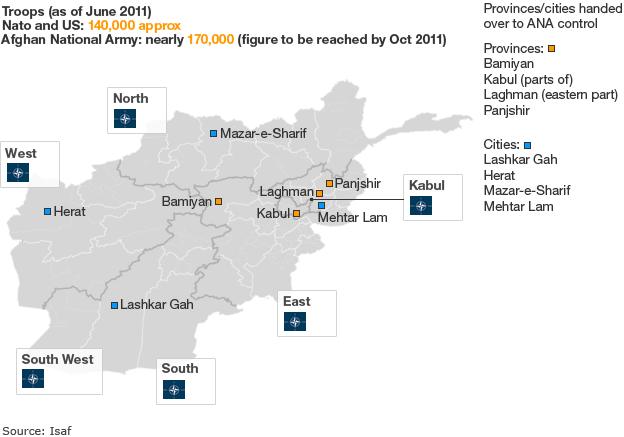Afghanistan drawdown risky, US joint chiefs head says
- Published
Adm Mike Mullen: "No commander wants to sacrifice fighting power in the middle of a war"
The top US military officer has said President Barack Obama's plan to withdraw troops from Afghanistan is "more aggressive" than he had advised.
Adm Mike Mullen said leaving troops in place was "the safer course", but added he supported the president's decision.
Secretary of State Hillary Clinton said Mr Obama had kept a pledge to begin withdrawals by July 2011.
On Wednesday Mr Obama announced the withdrawal of 33,000 troops from Afghanistan by September 2012.
Afghan President Hamid Karzai welcomed the move, but the Taliban dismissed it as "symbolic" and vowed to continue fighting until all foreign forces left.
In a series of interviews and congressional hearings on Thursday, senior US officials lent their support to Mr Obama's decision to remove about one-third of the US troops from Afghanistan by the end of next summer.
Defence Secretary Robert Gates acknowledged that the president had taken account of waning domestic political support when making the decision, AFP news agency reported.
Meanwhile, President Obama visited Fort Drum military base in New York state on Thursday, where he reiterated the messages conveyed in his speech on Wednesday evening.
'Broken momentum'
The newly announced US reductions are larger and faster than military commanders had advised.
At a House of Representatives committee hearing, Adm Mullen, the chairman of the joint chiefs of staff, said Mr Obama's decisions were "more aggressive and incur more risk than I was originally prepared to accept".
"More force for more time is, without doubt, the safer course. But that does not necessarily make it the best course," he said.
"Only the president, in the end, can really determine the acceptable level of risk we must take."
Mr Mullen told lawmakers Mr Obama considered the views of senior military officials, and said the drawdown would not jeopardise the effort to quash the insurgency.
President Obama's nominee to head the Central Intelligence Agency, General David Petraeus, echoed Mr Mullen's remarks on Thursday, while testifying on his nomination before members of the Senate Select Committee on Intelligence.
"The ultimate decision was a more aggressive formulation in terms of the timeline than what we had recommended," Mr Petraeus said, adding that he would stand by the president while he remained commander of coalition forces in Afghanistan.
Separately, in a Senate committee hearing, Mrs Clinton said the 10-year-old US military effort in Afghanistan had "broken the Taliban's momentum".
"We do begin this drawdown from a position of strength," she said.
'Unnecessary risk'
At least 68,000 US troops will remain in the country after the 33,000 have been withdrawn, but they are scheduled to leave by 2013, provided that Afghan forces are ready to take over security.
Meanwhile, Republican Senator John McCain, who lost the 2008 presidential election to Mr Obama, vigorously opposed the troop withdrawal in a speech on the Senate floor.
He said Mr Obama had opted to deny military commanders in Afghanistan the capability finally to defeat "a battered and broken enemy".
"I'm very concerned that the president's decision poses an unnecessary risk to the progress we've made thus far, to our mission, and to our men and women in uniform," he said. "Our troops are not exhausted, they are excited that after 10 years" they are finally approaching victory.
Correspondents say the enormous cost of the deployment - currently more than $2bn (£1.25bn) a week - has attracted criticism from congressional leaders, while the public is weary of a war that seems to have no end and has left at least 1,500 personnel dead and 12,000 wounded.
There have also been changes on the ground, notably the killing in May of al-Qaeda leader Osama Bin Laden by US forces in Pakistan.
On Thursday, French President Nicolas Sarkozy followed Mr Obama's lead by announcing the phased withdrawal of 4,000 French soldiers serving in Afghanistan.
